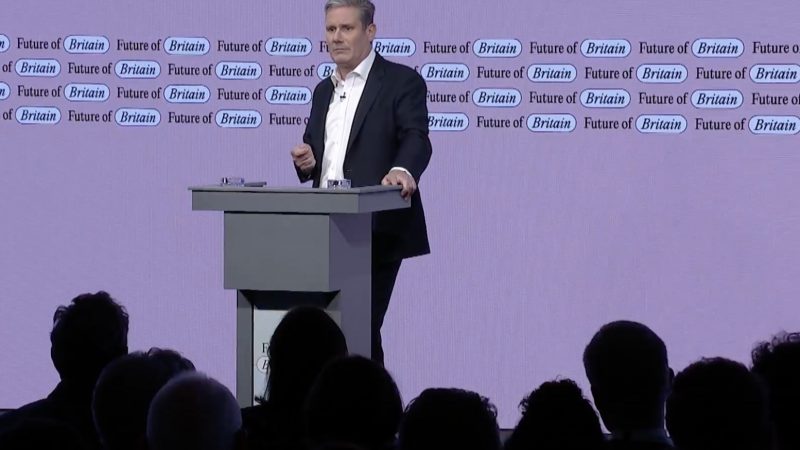
Keir Starmer has declared that the “stand-aside state” cannot cope in the current global climate and argued for a “new growth model for Britain” that “charts a new course” while also ensuring economic stability.
Speaking at the Tony Blair Institute for Global Change’s conference this afternoon, the Labour leader backed economic redistribution but stressed that “it can’t be a one-word plan for everywhere outside of the South East”.
He warned that Labour loses elections when it forgets security, aspiration, wealth creation and economic stability, telling attendees that the party’s project under his leadership is to return to the “service of working people”.
But in a question-and-answer session with Blair following his speech, Starmer argued that the next stage before the election will require the party to be “even tougher”, more focused and more disciplined.
He appeared to allude to the two-child benefit limit as one example of a “tough decision”, saying the party had had one “in the past few days”. The Labour leadership has faced considerable criticism from within the party following Starmer’s announcement over the weekend that the party would not scrap the policy.
During his speech, Starmer argued that it is necessary to be “proactive” to grow the economy “through difficult times”, telling attendees: “The stand-aside state can’t cope with the world in front of us.
“Where other countries don’t behave in the way market dogma expects, where global supply chains can be weaponised by tyrants and where, for working people, trickle-down growth means power trickles up and jobs trickle out.”
He continued: “On the road back to hope and opportunity, the signpost is labelled growth. Growth for our purpose. Growth for our project. Growth for our programme. A new growth model for Britain, that accepts the imperative of economic stability, but still charts a new course.”
Starmer argued: “The central reason progressive parties around the world have struggled to connect to working people isn’t anything to do with woke. That’s a distraction on both sides of politics.
“It’s rather that an underlying assumption of that traditional argument, that growth would be distributed evenly across a country and its people, has – when faced with the headwinds of globalisation and technology – collapsed.
“But also that, while redistribution will always be a tool in our box, it can’t be a one-word plan for everywhere outside of the South East. That’s not enough on its own to persuade people, working people, that the traditional argument still holds.”
Starmer said one area “where I do take issue with Tony [Blair]” is the “idea that this is somehow beyond left and right”, arguing that “this is a progressive moment”.
Blair said during the Q&A session that Starmer had done an “amazing job”, taking Labour from the “brink of extinction” to the brink of government.
The former Prime Minister said he is a “fan” of Labour’s missions in setting clarity of direction, particularly after regular changes of Prime Minister under the Conservatives. But he noted that Labour faces a “grim” inheritance if it wins the next election, unlike in 1997.
Starmer said he was “trying to do Kinnock, Smith and Blair” in five years, requiring making changes at pace and having to be “ruthless” and make difficult decisions.
The Labour leader also said he reminds himself ever day that going from the 2019 general election result to just a one-seat majority requires a bigger swing than in 1997, saying: “That gives me a sharp intake of breath.”




More from LabourList
‘Labour council candidates – it’s tough, but all is not lost’
‘Labour won’t stop the far right by changing leaders — only by proving what the left can deliver’
‘Cutting Welsh university funding would be economic vandalism, not reform’